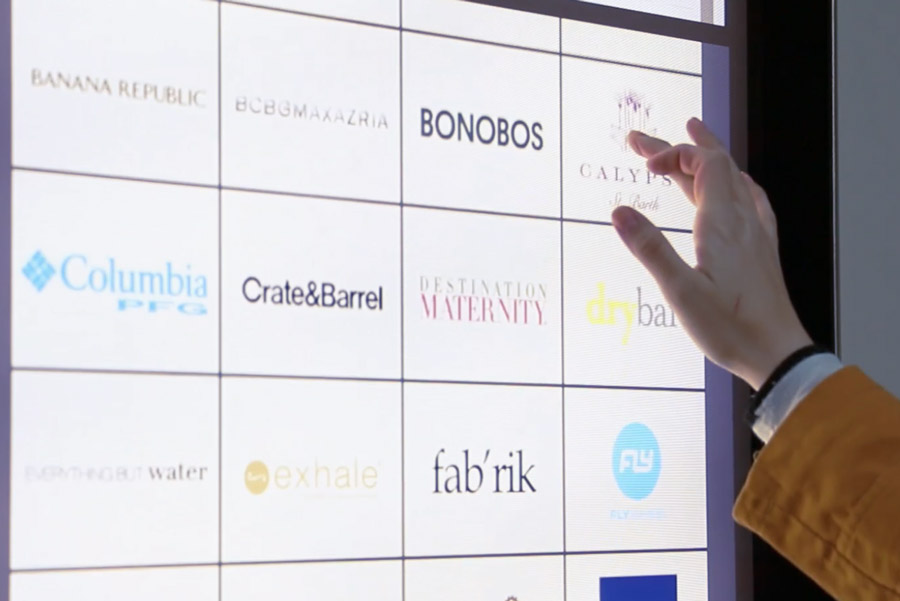Manufacturing Resources International, the firm behind BoldVu® outdoor LCD technology employed by leading out-of-home media companies for street furniture and transit screens, has just released the world’s first “All-Glass Touch Panel” for their large format outdoor digital displays. This touch technology delivers a truly tablet-like touch experience, with as fast as 10ms response time.
This new type of projected capacitive (PCAP) touch panel sets a new global benchmark for optical performance with transmissivity of 93.46%, 0.006% diffuse reflection, and 1.948% specular reflection. For those less familiar with what these numbers mean in the real world, this new touch technology is, for all intents and purposes, invisible to the human eye and allows for uninhibited image projection.
“This is truly a huge leap forward for touch technology in outdoor displays,” says Bill Dunn, President and CEO of MRI. “With increasing market momentum around the digitization of street furniture and deployment of smart city kiosks, this monumental breakthrough in visual performance of touch-enabled displays could not have come at a better time.”
Existing PCAP Sensors
This All-Glass touch technology is a tremendous leap forward over other types of PCAP touch panels used in most interactive outdoor displays today. By comparison, traditional micro-mesh PCAP panels when placed behind even the clearest of glass have a transmission of 76.7%, which translates to needing 1.22x more backlight power to achieve luminance (x) as the same display would without the touch panel.
Another variation of PCAP technology, constructed of wire sensors sandwiched between panes of a clear plastic called polyethylene terephthalate (PET), range between 86-91% transmissive, which is better than the wire mesh approach, but still results in a necessary increase in backlight power somewhere between 1.02-1.07x to achieve the luminance (x) as the same display without the touch panel. And because of their plastic composition, they tend to warp and lose their responsiveness from constant expansion and contraction due to prolonged solar exposure and temperature fluctuation.
Optical Shortcomings
Micro-mesh and PET-based wire PCAP panels, by nature of their physical structure, often exhibit a strong specular reflection or metallic “glint”, especially when viewed off-angle. Next time you see an outdoor kiosk with a touch panel, look a little more closely and you can actually see the wires running through the screen.
Another issue with other wire-mesh and PET-based PCAP sensors is the amount of diffuse reflection they exhibit. Diffuse reflection refers to the way a ray of light is scattered at many angles. The higher the diffuse reflection, the more the contrast and color gamut drop through the floor. High diffuse reflection is particularly evident when viewing dark content – black isn’t actually black, it’s grey. Inability to produce high contrast results in dull and barely visible picture.
Micro-mesh and PET-based touch sensors also suffer from highly noticeable birefringence when viewed through polarized sunglasses. You have probably seen this before when filling up at the gas station – strange colors and patterns appear on the pump’s digital screens. Using touch technology that blacks out and distorts a human-sized, outdoor display when viewed with sunglasses is hardly ideal. This effect devalues the advertising space and is a hard sell knowing that so much time and energy goes into maintaining brand integrity.
The All-Glass Touch Panel
MRI’s new touch technology, unlike the others discussed thus far, uses no plastics or wires, and is instead comprised of a multi-layered, laminated stack of glass panes. Bill Dunn comments, “The visual difference between this and other PCAP screens is astounding, colors are so much more vibrant, and blacks are truly black. And there are no wires!” There is also no birefringence when viewed with polarized sunglasses and as promised, the screens feel very responsive to touch interaction.
MRI’s All-Glass Touch Panel is exclusively shipping on BoldVu® 55-inch outdoor displays, with 75-inch and 86-inch versions to be made available in early 2018. The price premium for the All-Glass Touch Panel on BoldVu® displays will be very comparable with other PCAP touch panels in use today.

